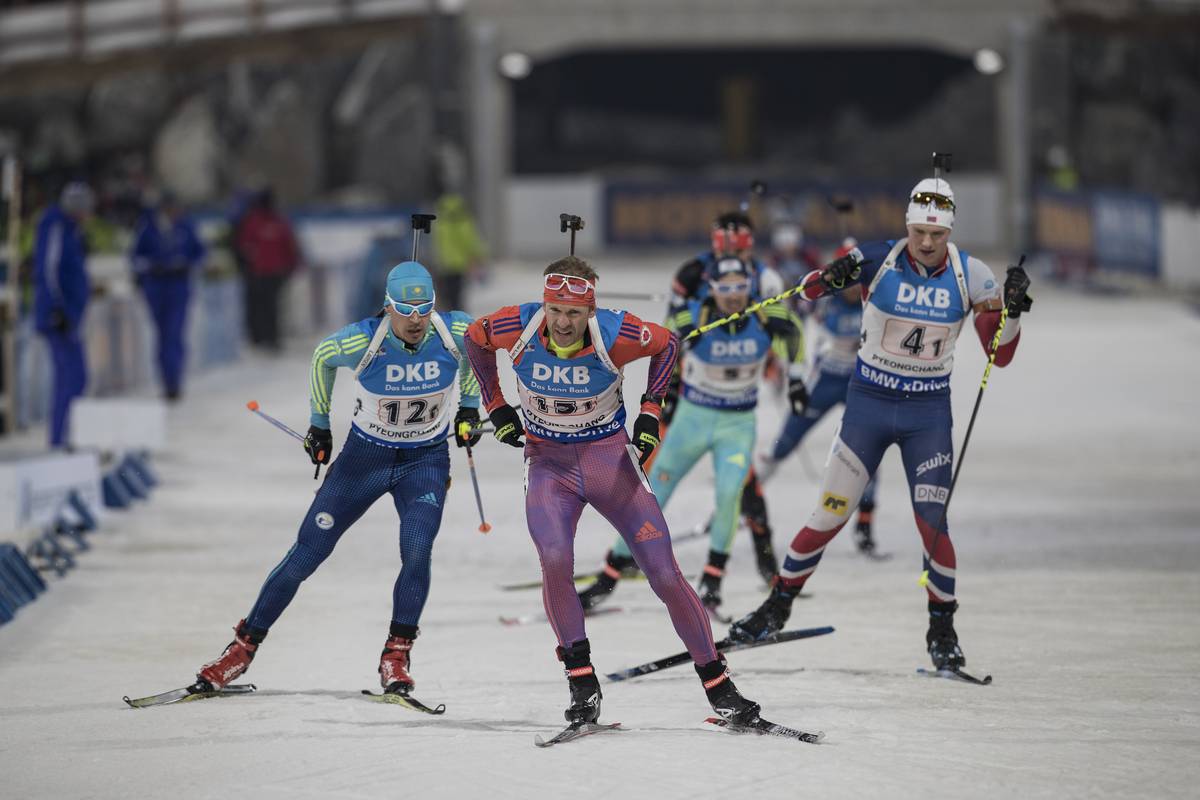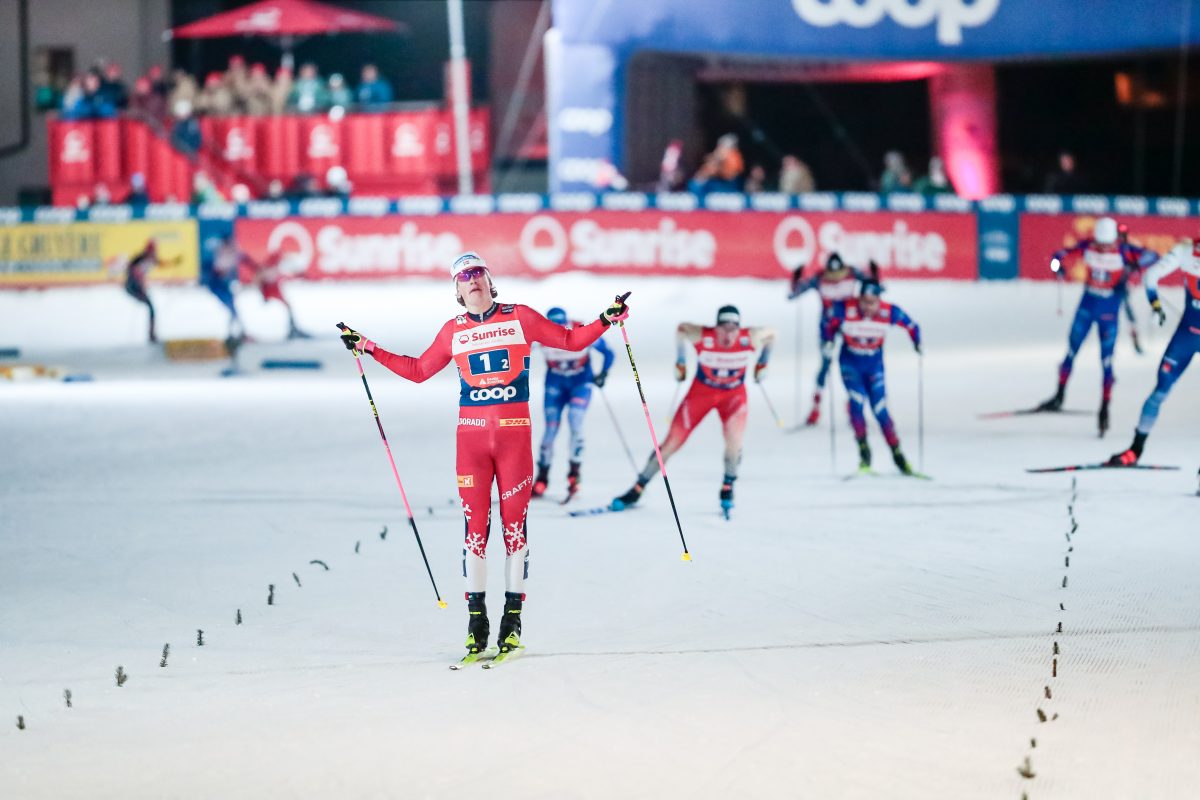
Twelve individual wins so far this season? No problem. And on Sunday, France’s Martin Fourcade used the 4 x 7.5 k World Cup relay in PyeongChang, South Korea, as another opportunity to demonstrate that he’s the best in the world.
Starting the final leg of the relay with a 16-second advantage over Austria thanks to hard work by teammates Jean Guillaume Beatrix, Simon Fourcade (his older brother), and Simon Desthieux, Fourcade missed a startling four targets. Yet still grew the French lead to 33.8 seconds by the finish line.
On the range, he appeared almost careless, shooting quickly, missing a few, and then using spare rounds to clean them. With his ski speed, it didn’t matter.
Norway finished third, +45.4 seconds.
While the 12.5 k pursuit the day before – which Fourcade had won handily – was marked by a calm shooting range and a sizeable handful of competitors shooting 20-for-20, things changed completely over the next 24 hours and every men’s team in the relay had quite a few spare rounds. 15 of the 24 teams which started also had at least one penalty loop.
“The conditions were definitely trickier on the range today, with gusting winds that changed direction frequently,” U.S. Biathlon’s Lowell Bailey wrote in an email.
Bailey kicked things off for the U.S. team, and the newly crowned World Champion had another strong performance, shooting 10-for-10 and hanging with the leaders despite a hard pace.
“The first lap was one of the fastest starting paces I’ve ever witnessed,” he wrote. “I just tried to stay in line, catch some drafts, and I was able to make up a bunch of time on the leaders through the backside of the stadium before shooting.”
Several other teams shot clean, and Norway’s Vetle Sjåstad Christiansen was the fastest among them. Bailey couldn’t stay with him and at the end of his 7.5 k bout. He tagged off second, 5.5 seconds back.
“Christiansen put in a brutal 400m sprint out of the range and I just couldn’t match him for that stretch,” Bailey wrote. “Once we got to the hills, I was able to make back a little bit of time but I didn’t quite make it back to the lead by the tag.”
Leif Nordgren took over and held his position through a clean prone stage, then used two spares in standing. But with lots of misses by the rest of the field, that still kept him in fourth place, just over 30 seconds back from the leaders. He lost ground on the final loop and tagged off seventh, but still 49.6 seconds back.
That put the team’s performance on the shoulders of Paul Schommer, who had raced just a few World Cups in his career and never a relay. The unpredictable wind threw him for a loop and he used all three spare rounds in each shooting bout – but did avoid the penalty loop.
“Unfortunately I wasn’t quite as sharp on the range as I’d like, and didn’t have the ski shape to make up for my mistakes,” he wrote in an email. “In the races I definitely was disappointed with my performance on the range. The approach is relatively easy but the wind did make things a bit tricky at times… [but] overall it was a good experience and I hope to build off of it moving forward.”
Schommer tagged to Sean Doherty in 13th, +2:54.9. Doherty used just one spare and though he lost some more time to the winning French team, he was able to make up three placed and cross the finish line in tenth, +3:12.8.
“I’m proud of a top-ten in this crowd,” Bailey wrote. “It was Paul’s first World Cup Relay appearance and he did a good job handling the pressure and staying out of the loop! Leif and Sean both had solid legs, and Sean pushed it in the last loop to keep us in the top ten!”
While the U.S. used a fast start to get their top-ten, Canada used just steady, even biathlon performances. Christian Gow had used just one spare round and tagged off in ninth, 27.5 seconds back, in the first leg. He agreed with Bailey’s assessment of how things had gone.
“It was a brutal pace right from the start, but I feel like I managed it well and am happy with the end result,” he wrote in an email. “The wind was definitely a bit tricky today, more so for my standing than my prone. I am really happy with how I performed in the range, I would have liked to have cleaned the standing as well, but I shot my one spare quite quickly so it didn’t cost me a lot of time.”
His brother Scott took over, also using just one spare and clocking a ski time fast enough to move the team up to sixth. He called the race his “best skiing of the year.”
“I had the benefit of skiing with Benjamin Weger [of Switzerland] for my first and last loop,” Scott Gow explained. “He was definitely feeling strong and moving well on his skis, so I was fortunate to hitch a ride with him. My body has been feeling good this week so I knew I had the ability to stay with him. Our skis were quite fast as well and that helped a lot to keep us in the race.”
From there, the tag went to Nathan Smith, who contributed to Canada’s World Championships bronze medal relay team last season but had taken all but one week of this year’s season off to recover from cytomegalovirus.
“I still don’t feel very good skiing,” Smith admitted. “I was hoping to see some improvement from the couple races I did at the beginning of the season. I didn’t know what to expect, but was honestly expecting to be able to make pursuits with 90% shooting. Definitely not the case yet.”
Smith traveled to PyeongChang partly to preview next year’s Olympic venue, regardless of his race shape. In the relay, he used five spare rounds and had the 20th-ranked ski time.
“The relay went better for myself than the sprint,” he explained. “Physically I felt a little better on the tracks. The wind actually didn’t seem too bad. I was surprised with how many shooting errors there were. For myself, standing was definitely sketchy. I probably over-did it a little trying to keep up.”
Canada was in tenth, but Brendan Green was able to race them up to seventh, +3:03.1, on the anchor leg thanks to just two spare rounds.
“I suffered through a lot of yesterday’s pursuit race, so I had no idea what to expect today,” Green wrote in an email. “My shooting was solid which is what made the difference for me personally during the race. I did my best skiing and it was tough, but I handled the shooting well given some tricky wind conditions.”
Previously, the team hadn’t finished better than tenth in a relay this season.
“I’m for sure happy with the team’s effort and performance today, and this result is a positive way for us to end our time here in Korea,” Green wrote. “Today was definitely a positive result for the team.”
Chelsea Little
Chelsea Little is FasterSkier's Editor-At-Large. A former racer at Ford Sayre, Dartmouth College and the Craftsbury Green Racing Project, she is a PhD candidate in aquatic ecology in the @Altermatt_lab at Eawag, the Swiss Federal Institute of Aquatic Science and Technology in Zurich, Switzerland. You can follow her on twitter @ChelskiLittle.



